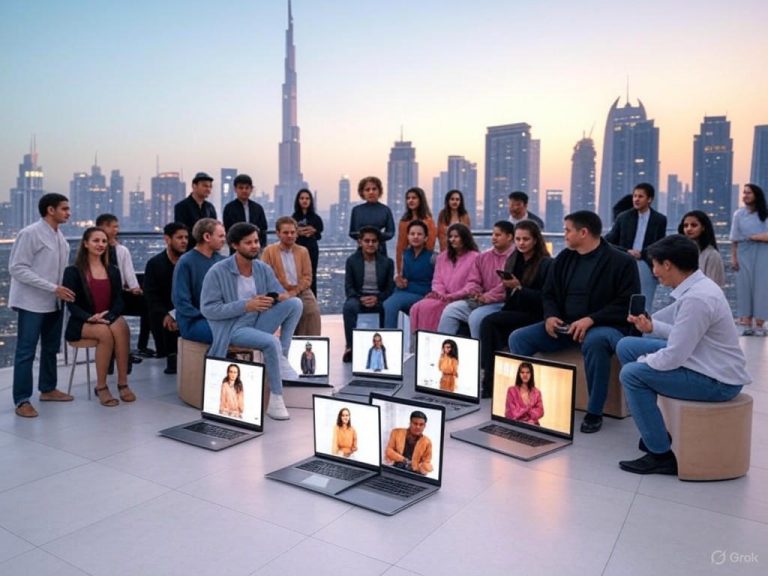Introduction to Online Fashion Retail Platform in the UAE
The United Arab Emirates, particularly Dubai, stands as a global hub for innovation and commerce, making it a prime location for launching an online fashion retail platform. This business opportunity holds immense potential for entrepreneurs and investors looking to tap into the thriving business in Dubai landscape. With a growing digital economy, a diverse consumer base, and a strategic geographic position, the UAE offers a fertile ground for e-commerce ventures focused on fashion. This comprehensive analysis explores the viability, challenges, and growth potential of an online fashion retail platform in Dubai, providing actionable insights for stakeholders interested in investment in Dubai and the broader UAE market.
Comprehensive Business Overview
What is an Online Fashion Retail Platform?
An online fashion retail platform is a digital marketplace that connects fashion brands, designers, and consumers through a user-friendly interface. Operating within the e-commerce industry, this business model focuses on selling apparel, accessories, footwear, and related products via a website or mobile app. In the UAE, the platform would target a diverse audience, including locals, expatriates, and tourists, with a focus on trendy, luxury, and sustainable fashion.
Mission, Vision, and Objectives
The mission of this platform is to revolutionize the fashion shopping experience in the UAE by offering a curated selection of global and local brands at competitive prices. The vision is to become the leading online fashion destination in Dubai and beyond, aligning with the UAE’s digital transformation goals. Core objectives include achieving a 20% market share within five years, fostering customer loyalty through personalized experiences, and promoting sustainable fashion practices.
Business Stage and Location
Currently in the ideation and startup phase, this online fashion retail platform is ideally suited for establishment in a Dubai Free Zone, such as the Dubai Internet City or Dubai Media City. These zones offer tax exemptions, full ownership for foreign investors, and proximity to a tech-savvy ecosystem, making them perfect for launching a digital business in Dubai.
Competitive Advantage
Entrepreneur’s Perspective: Why It’s Viable
For entrepreneurs, the online fashion retail platform is a viable venture due to the UAE’s high internet penetration rate (over 99%) and the growing preference for online shopping. The business can leverage Dubai’s reputation as a fashion hub to attract a loyal customer base, while low operational costs in Free Zones reduce financial barriers.
Investor’s Perspective: An Attractive Opportunity
From an investor’s standpoint, this platform represents a lucrative investment in Dubai due to the e-commerce sector’s projected growth at a CAGR of 23% from 2023 to 2028 (source: Statista). Scalability, coupled with Dubai’s tax-free environment, enhances ROI potential, making it a compelling opportunity for those exploring investment in UAE markets.
Manager’s Perspective: Operational and Strategic Edge
Managers benefit from the platform’s use of cutting-edge technology, such as AI-driven personalization and automated inventory systems, which streamline operations. Strategic partnerships with local logistics providers also ensure efficient delivery across Dubai and the UAE, giving the platform a competitive edge.
Market Analysis and Opportunities
Target Market Analysis
The UAE fashion e-commerce market is valued at approximately AED 12 billion and is expected to grow at a CAGR of 18% by 2027 (source: Euromonitor). Dubai, with its affluent population and tourist influx, accounts for a significant share of this market. Consumer behavior in the region favors premium and luxury brands, with a growing demand for sustainable and modest fashion. Key trends shaping the market include digital transformation, mobile shopping, and a preference for fast delivery services.
Marketing Needs
To penetrate the competitive UAE market, extensive market research is essential to understand local preferences. Digital campaigns focusing on SEO, PPC advertising, and social media platforms like Instagram and TikTok are critical for visibility. Branding strategies should emphasize cultural sensitivity and luxury appeal to resonate with Dubai’s diverse audience. Collaborating with influencers and hosting fashion events can also boost engagement.
Expansion Potential
Beyond Dubai, the platform can explore opportunities in other UAE emirates like Abu Dhabi and Sharjah, as well as GCC countries such as Saudi Arabia and Qatar. Diversifying into B2B partnerships with local designers or exporting to international markets via Dubai’s logistics hubs can further fuel growth.
Financial and Investment Needs
Financial Requirements
Starting an online fashion retail platform in Dubai requires an estimated initial capital of AED 500,000 to AED 1 million. Key cost categories include:
– Platform development and technology: AED 200,000
– Marketing and branding: AED 150,000
– Licensing and Free Zone setup: AED 50,000
– Staffing and operations: AED 100,000
These figures can vary based on the scale of operations and partnerships.
Investment Potential
The platform’s scalability and alignment with Dubai’s digital economy make it an attractive proposition for investors. Equity investments or venture capital are ideal models, offering high returns given the projected market growth. For tailored guidance, exploring Investment Consulting Services can provide deeper insights into maximizing ROI in the UAE.
Financial Risks and Mitigation
Key financial risks include high setup costs, cash flow challenges during the initial phase, and currency fluctuations. Mitigation strategies include diversifying revenue streams through affiliate marketing, securing insurance for operational risks, and working with financial advisors to ensure stability.
Human Resources and Recruitment
Workforce Needs
The platform requires a team of 10–15 employees initially, including:
– Web developers and IT specialists
– Digital marketing experts
– Customer service representatives
– Logistics coordinators
Critical skills include e-commerce expertise, data analysis, and multilingual communication to cater to Dubai’s diverse population.
HR Challenges and Solutions
Attracting talent in the UAE’s competitive market can be challenging due to high salary expectations. Offering competitive benefits, flexible work arrangements, and training programs can address retention issues. For support in this area, check out Hiring and Staffing Services to streamline recruitment processes.
Compliance with UAE Labor Laws
Adhering to UAE labor laws, such as visa sponsorship, contract regulations, and end-of-service benefits, is non-negotiable. Regular audits and consultations with legal experts ensure full compliance with regulations set by the Ministry of Human Resources and Emiratisation (MOHRE).
Infrastructure and Operations
Infrastructure Needs
A virtual office in a Dubai Free Zone, combined with cloud-based systems for inventory and customer management, reduces overhead costs. Investment in a robust e-commerce platform and mobile app is crucial, alongside partnerships with logistics providers for seamless delivery.
Operational Optimization
Weaknesses in supply chain management, such as delayed shipping or stock shortages, can hinder efficiency. Implementing ERP systems and partnering with reliable couriers can address these issues, ensuring a smooth customer experience.
Legal Compliance
Registering the business under a Dubai Free Zone authority, obtaining an e-commerce license, and opening a corporate bank account are essential steps. Regular compliance checks with the Department of Economic Development (DED) safeguard against legal issues.
Innovation and Technology
Adopting emerging technologies like AI for personalized recommendations and AR for virtual try-ons can differentiate the platform. Continuous investment in digitization ensures competitiveness in Dubai’s fast-paced market.
Marketing and Branding Strategies
Brand Status
As a startup, brand awareness is currently minimal, requiring a strong focus on visual identity and positioning as a premium yet accessible platform. Highlighting local and sustainable fashion can build trust among UAE consumers.
Marketing Channels
Leveraging digital channels like social media, SEO, and email marketing is key to reaching Dubai’s tech-savvy audience. Traditional channels, such as fashion expos and mall activations, can complement online efforts. For expert strategies, explore Business Sale & Promotion Service to enhance visibility.
360-Degree Campaigns
Comprehensive campaigns integrating Instagram ads, influencer collaborations, and email newsletters can maximize reach. Hosting virtual fashion shows or pop-up events in Dubai can further elevate customer interaction.
Growth and Development Potential
Growth Strategies
Plans for market expansion include targeting niche segments like modest fashion and eco-friendly apparel. Strategic partnerships with GCC-based designers can also drive sales growth in the region.
Networking
Building connections with local suppliers, Free Zone authorities, and fashion communities is crucial. Leveraging networks like those offered by Persian Horizon, which spans 57 countries, can unlock new opportunities for collaboration.
International Potential
Dubai’s role as a global trade gateway positions the platform for international expansion. Markets in Europe and Asia can be targeted through e-commerce export programs facilitated by Dubai’s logistics infrastructure.
Sustainability and Innovation
Focusing on sustainable practices, such as eco-friendly packaging and carbon-neutral shipping, aligns with Dubai’s Vision 2030. Tech-driven solutions like blockchain for supply chain transparency can set the platform apart.
Alignment with Dubai’s Market
Cultural Alignment
The platform must cater to Dubai’s multicultural society by offering a diverse product range, including modest fashion for conservative customers. Multilingual support and culturally sensitive marketing are vital for resonance.
Local Regulatory Compliance
Ensuring adherence to UAE commercial and tax laws, including VAT regulations, is critical. Partnering with legal consultants can address any compliance gaps effectively.
Advantages of Dubai
Dubai’s tax-free environment, world-class infrastructure, and access to a global consumer base are unparalleled benefits. Hosting events like Dubai Fashion Week provides unique marketing opportunities for the platform.
Local Challenges and Solutions
High competition from established players like Namshi and Noon poses a challenge. Differentiation through niche offerings, superior customer service, and localized branding can help overcome this hurdle.
Conclusion and Recommendations
The online fashion retail platform presents a promising opportunity for stakeholders interested in Dubai business opportunities. With a growing market, strategic location, and supportive infrastructure, Dubai offers the ideal environment for this venture. However, success hinges on robust marketing, technological innovation, and regulatory compliance. Entrepreneurs and investors should prioritize partnerships, scalability, and cultural alignment to maximize impact.
Call-to-Action
Ready to launch or scale your online fashion retail platform in the UAE? Explore comprehensive support through Business Launch Service or connect with experts via Contact Us to turn your vision into reality. For more insights on navigating the UAE market, visit our Blog or dive into our Podcast for expert advice. Additionally, check out Services and Business Development Service for tailored solutions to grow your venture in Dubai.







